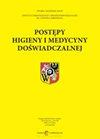Effect of pasteurization on melatonin concentration in human breast milk
IF 0.3
4区 医学
Q4 MEDICINE, RESEARCH & EXPERIMENTAL
引用次数: 1
Abstract
Abstract Introduction Women who have problems with lactation can use human milk banks. Mainly this human milk is provided to premature babies and sick newborns. Human milk is the most suitable food for newborns and infants, recommended by WHO (World Health Organization). Human milk has anti-inflammatory, anti-infective, and anti-allergic properties, and also works for immunomodulation. Melatonin has a special, underestimated importance in the composition of breast milk. It is a hormone that has many body functions and, for several decades, its antioxidant potential has been increasingly talked about. The aim of the study was to examine the effect of Holder pasteurization on melatonin concentration in human milk. Materials and Methods 18 samples of human milk from donors from the human milk bank were used for the analysis. Melatonin concentration before and after pasteurization was determined by ELISA. In addition, the nutritional content composition of milk was analyzed using MIRIS Human Milk Analyzer and correlations examined. Results Melatonin concentration in human milk before pasteurization was 0.65–26.24 pg/mL (Me=9.58, IQR=12.72), while after pasteurization 0.80–29.58 pg/mL (Me=9.98, IQR=11.26). There was a positive correlation between melatonin concentration before and after pasteurization (r=0.797, p<0.001). Conclusions The Holder pasteurization process does not affect the concentration of melatonin in milk samples, which may be a recommendation for human milk banks.巴氏灭菌对母乳褪黑素浓度的影响
摘要简介哺乳期有问题的妇女可以使用母乳库。这种母乳主要提供给早产儿和患病新生儿。母乳是世界卫生组织推荐的最适合新生儿和婴儿食用的食物。母乳具有抗炎、抗感染和抗过敏特性,还具有免疫调节作用。褪黑激素在母乳成分中具有特殊的、被低估的重要性。它是一种具有多种身体功能的激素,几十年来,它的抗氧化潜力越来越受到人们的关注。本研究的目的是检验霍尔德巴氏灭菌对母乳中褪黑素浓度的影响。材料与方法采用来自母乳库的18份母乳样本进行分析。用ELISA法测定巴氏灭菌前后褪黑素的浓度。此外,使用MIRIS母乳分析仪对牛奶的营养成分进行了分析,并检验了相关性。结果巴氏灭菌前母乳中褪黑素浓度为0.65~26.24 pg/mL(Me=9.58,IQR=12.72),巴氏灭菌后的褪黑素浓度为0.80–29.58 pg/mL(Me=9.98,IQR=11.26)。巴氏灭菌前后褪黑素浓度呈正相关(r=0.797,p<0.001)。结论Holder巴氏灭菌过程不会影响牛奶样品中褪黑素的浓度,这可能是母乳库的一个建议。
本文章由计算机程序翻译,如有差异,请以英文原文为准。
求助全文
约1分钟内获得全文
求助全文
来源期刊

Postȩpy higieny i medycyny doświadczalnej
MEDICINE, RESEARCH & EXPERIMENTAL-
CiteScore
0.60
自引率
0.00%
发文量
50
审稿时长
4-8 weeks
期刊介绍:
Advances in Hygiene and Experimental Medicine (PHMD) is a scientific journal affiliated with the Institute of Immunology and Experimental Therapy by the Polish Academy of Sciences in Wrocław. The journal publishes articles from the field of experimental medicine and related sciences, with particular emphasis on immunology, oncology, cell biology, microbiology, and genetics. The journal publishes review and original works both in Polish and English. All journal publications are available via the Open Access formula in line with the principles of the Creative Commons licence.
 求助内容:
求助内容: 应助结果提醒方式:
应助结果提醒方式:


